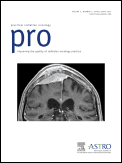
Practical Radiation Oncology
Scope & Guideline
Unlocking Potential in Radiation Medicine
Introduction
Aims and Scopes
- Clinical Research and Trials:
The journal emphasizes original research, particularly clinical trials that evaluate the efficacy and safety of radiation therapy across various cancer types, including prostate, breast, and head and neck cancers. - Technological Advancements:
There is a consistent focus on the integration of new technologies in radiation therapy, including MRI-guided therapy, stereotactic body radiation therapy (SBRT), and artificial intelligence applications for treatment planning. - Multidisciplinary Approaches:
The journal highlights the importance of collaborative practices in oncology, showcasing studies that involve multidisciplinary teams for comprehensive cancer care. - Patient-Centered Outcomes:
Research addressing patient-reported outcomes and quality of life post-treatment is a core area, emphasizing the importance of patient experiences in evaluating treatment effectiveness. - Guidelines and Best Practices:
The journal plays a crucial role in disseminating clinical practice guidelines and consensus statements that shape standard care practices in radiation oncology.
Trending and Emerging
- Integration of Artificial Intelligence:
There is a rising trend in the application of artificial intelligence for treatment planning and predictive modeling in radiation oncology, showcasing the journal's commitment to incorporating cutting-edge technology. - Personalized and Adaptive Radiation Therapy:
Emerging studies are focusing on personalized treatment plans and adaptive radiation therapy strategies, indicating a shift towards tailored approaches that consider individual patient factors. - Immunotherapy and Radiation Synergy:
Research exploring the combination of immunotherapy with radiation treatment is gaining traction, reflecting a growing interest in optimizing treatment regimens for various cancer types. - Quality Assurance and Safety Practices:
An increasing number of articles are addressing quality assurance protocols and safety practices within radiation oncology, underlining the field's commitment to enhancing treatment reliability and patient safety. - Patient-Reported Outcomes and Quality of Life:
There is a notable increase in studies emphasizing patient-reported outcomes, highlighting the importance of patient experiences and satisfaction in evaluating the effectiveness of radiation therapy.
Declining or Waning
- Traditional Radiation Techniques:
There is a noticeable decline in studies centered on conventional radiation techniques, as the field shifts towards more advanced methods like SBRT and adaptive radiation therapy. - Basic Science Research:
Research articles focused on the fundamental biological mechanisms of radiation therapy are less frequent, indicating a potential shift towards clinical applications and outcomes. - Palliative Care Studies:
The focus on palliative radiation therapy is waning, possibly due to a growing emphasis on curative approaches and the integration of systemic therapies with radiation.
Similar Journals

Japanese Journal of Radiology
Pioneering Insights in Radiological PracticesThe Japanese Journal of Radiology, published by SPRINGER, serves as a premier platform for disseminating cutting-edge research and clinical advancements in the fields of radiology, nuclear medicine, and imaging. With an ISSN of 1867-1071 and E-ISSN 1867-108X, this journal has established itself as a vital resource for practitioners, researchers, and students alike. Renowned for its high-quality peer-reviewed articles, it currently enjoys a respectable impact factor within the Q2 category of Scopus rankings, placing it in the 69th percentile among 333 journals in its field. The journal has seen consistent convergence of research from 2009 to 2024, further underscoring its commitment to advancing the understanding of radiological practices. Importantly, the journal offers Open Access options to facilitate widespread dissemination of knowledge, ensuring that vital research reaches its audience without barriers. Addressed in Japan, the Japanese Journal of Radiology plays a critical role in enhancing the global discourse on medical imaging, making it an essential resource for anyone engaged in this dynamic field.

Radiation Oncology Journal
Advancing cancer care through innovative radiation research.Radiation Oncology Journal, published by the Korean Society of Therapeutic Radiology & Oncology, stands at the forefront of cancer treatment research and innovation within the dynamic fields of oncology and radiology. With a focus on disseminating groundbreaking findings and advancements from 2012 to 2024, this journal aims to foster collaboration among researchers, clinicians, and educators dedicated to improving therapeutic techniques and patient outcomes in the context of radiation therapy. Recognized with a prestigious Q2 ranking in both the Oncology and Radiology, Nuclear Medicine and Imaging categories, it ranks 140th out of 333 in its Scopus category for Medicine Radiology and boasts a 58th percentile placement. While operating on a non-open access basis, the journal remains committed to providing valuable insights and updates to professionals in the field from its base in South Korea. As the landscape of cancer treatment evolves, the Radiation Oncology Journal continues to play a vital role in shaping research trends and enhancing the understanding of radiotherapy's role in comprehensive cancer care.
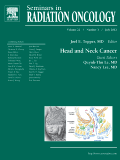
SEMINARS IN RADIATION ONCOLOGY
Exploring the Future of Radiation TherapySEMINARS IN RADIATION ONCOLOGY is a premier journal published by W B SAUNDERS CO-ELSEVIER INC, dedicated to advancing the field of radiation oncology through high-quality research and comprehensive reviews. With an impressive impact factor and a notable HIndex, this journal holds a prominent place within the academic community, particularly illustrated by its Q2 ranking in both Cancer Research and Oncology, and a Q1 ranking in Radiology, Nuclear Medicine, and Imaging as of 2023. Since its inception in 1991, the journal has served as a vital resource for researchers, clinicians, and healthcare professionals, facilitating the exchange of innovative ideas and practices that shape the future of cancer treatment. While the journal is not open access, it offers essential insights into the latest advancements in the field, catering to a diverse audience eager to expand their knowledge and improve patient outcomes in the realm of radiation therapy.

STRAHLENTHERAPIE UND ONKOLOGIE
Unveiling the future of cancer treatment and radiation therapy.STRAHLENTHERAPIE UND ONKOLOGIE is an esteemed journal published by Springer Heidelberg, focusing on critical advancements and research in the fields of Oncology and Radiology. Established in 1986, this journal has carved its niche within the scientific community, ranking in the Q1 category for Radiology, Nuclear Medicine and Imaging, and Q2 for Oncology as of 2023. With an ISSN of 0179-7158 and E-ISSN 1439-099X, it serves as an essential resource for researchers, professionals, and students dedicated to the complexities of cancer treatment and radiation therapy. While the journal operates under a subscription model, its broad international readership values its rigorous peer-review process and comprehensive coverage of pivotal studies. STRAHLENTHERAPIE UND ONKOLOGIE continues to enhance its impact in the domains of oncology and radiology, as evidenced by its commendable Scopus rankings, including a 76th percentile in Radiology and a 65th percentile in Oncology. Its commitment to disseminating innovative research solidifies its role as a cornerstone in the ongoing quest to improve patient care and therapeutic techniques.

Radiation Oncology
Advancing cancer care through innovative radiotherapy insights.Radiation Oncology is a premier scholarly journal published by BMC, dedicated to advancing the field of oncology through innovative research and comprehensive reviews since its inception in 2005. With its Open Access model, the journal ensures that the latest findings in radiotherapy and cancer treatment are accessible to a global audience, fostering collaboration and knowledge sharing among researchers, clinicians, and healthcare professionals. The journal has garnered an impressive reputation with prestigious rankings, achieving Q1 status in Radiology, Nuclear Medicine and Imaging and Q2 in Oncology as of 2023, reflecting its significant impact on the scientific community. In the Scopus rankings, it stands proud at Rank #61 in Radiology, Nuclear Medicine and Imaging, placing it in the top 81st percentile, and Rank #112 in Oncology at the 72nd percentile. With a converged publication plan extending through 2024, Radiation Oncology remains a vital resource for those dedicated to enhancing cancer treatment methodologies and outcomes.
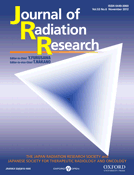
JOURNAL OF RADIATION RESEARCH
Leading the charge in open-access radiation science.JOURNAL OF RADIATION RESEARCH, published by Oxford University Press, is a prominent peer-reviewed journal focusing on the diverse fields of radiation science, including health, toxicology, and radiology. Since its inception in 1960, this open-access journal has provided a critical platform for the dissemination of high-quality research, making it accessible to a global audience of researchers, professionals, and students. With a consistent track record, the journal holds an impressive impact factor and is categorized in Q2 of Radiation studies and Q3 in Health and Toxicology as per the 2023 rankings, reflecting its influential role in shaping contemporary discourse in the field. The journal also boasts notable rankings within Scopus, further underscoring its importance in advancing knowledge and innovations related to radiation. Spanning from 1960 to 2024, the JOURNAL OF RADIATION RESEARCH remains at the forefront of scientific exploration and is essential reading for anyone committed to advancing the understanding of radiation and its effects.
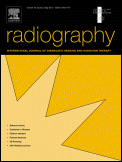
Radiography
Transforming Healthcare with Insightful Imaging StudiesRadiography is a premier academic journal published by ELSEVIER SCI LTD that focuses on the vital disciplines of radiology, nuclear medicine, and imaging technology. With an ISSN of 1078-8174 and an E-ISSN of 1532-2831, this journal has earned an impressive reputation, consistently ranking in the top quartiles across multiple categories in the 2023 Scopus rankings, including Q1 in Assessment and Diagnosis and Q1 in Research and Theory. Spanning decades of research from 1995 to 2024, Radiography provides a platform for cutting-edge studies, innovative techniques, and clinical advancements, making it essential reading for researchers, healthcare professionals, and students engaged in the fields of radiological sciences. Operating from the United Kingdom, and while not an Open Access journal, it offers a broad array of access options through institutional subscriptions, ensuring that critical research is available to stakeholders in the health professions. The journal's focus on both theoretical and practical aspects further underscores its role as a key resource in enhancing diagnostic practices and improving patient outcomes in the healthcare industry.
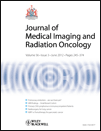
Journal of Medical Imaging and Radiation Oncology
Exploring New Horizons in Medical Imaging and Radiation TherapyJournal of Medical Imaging and Radiation Oncology, published by WILEY, is a pivotal resource in the fields of oncology and medical imaging. With an impact factor reflective of its commitment to advancing research, the journal has maintained a robust reputation since its inception in 2008 and continues to thrive through 2024. It is indexed with an insightful ranking, with a Q2 classification in Radiology, Nuclear Medicine and Imaging, affirming its importance in these disciplines. This journal not only serves as an open access platform, allowing extensive reach and accessibility, but also fosters a scholarly community dedicated to the innovation of imaging techniques and radiation oncology practices. As a key player in disseminating crucial findings and advancements, it appeals to researchers, clinicians, and students who aim to contribute to the evolving landscape of medical imaging and cancer treatment methodologies. The journal is based in Australia, at 111 River St, Hoboken, NJ, and invites submissions that push the boundaries of current knowledge in this critical area of healthcare.

International Journal of Particle Therapy
Advancing the Frontiers of Cancer TreatmentInternational Journal of Particle Therapy, an esteemed publication from the INT JOURNAL PARTICLE THERAPY, stands at the forefront of innovative research in the realms of particle therapy, radiology, and atomic physics. Established as an Open Access journal since 2015, it provides a platform for scholarly articles that drive the advancement of knowledge and practice in cancer treatment and radiation therapy. With an impact factor reflective of its rising stature, this journal has been categorized in the Q2 quartile for both Atomic and Molecular Physics and Radiology, Nuclear Medicine and Imaging as of 2023, illustrating its significant role in contributing to these vital fields. Researchers, professionals, and students alike will find the journal indispensable for accessing pioneering studies that explore the efficacy and application of particle therapy, ensuring that the latest advancements reach a broad audience. With a robust focus on bridging theoretical insights and clinical practices, the International Journal of Particle Therapy remains committed to enhancing patient outcomes and fostering collaboration among scientists worldwide.
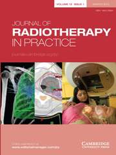
Journal of Radiotherapy in Practice
Innovating Patient Care Through Radiotherapy ResearchJournal of Radiotherapy in Practice is a peer-reviewed journal published by Cambridge University Press, focusing on the evolving field of radiotherapy and its application in clinical practice. With ISSN 1460-3969 and E-ISSN 1467-1131, this journal serves as a critical platform for researchers, clinicians, and students in oncology and radiology, providing vital insights into treatment methodologies, patient care, and innovative practices. Although indexed in Q4 quartiles for both Oncology and Radiology, Nuclear Medicine and Imaging, the journal plays an essential role in disseminating clinical findings and advancing the science of radiotherapy since its inception in 1999. Authors are encouraged to contribute their research, case studies, and reviews that align with the journal's objectives, fostering a collaborative environment for sharing knowledge. Despite its current rankings, the journal aims to enhance its impact and visibility in the scientific community, thereby enriching professional practice and patient outcomes in the realm of radiotherapy.